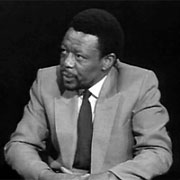Related Research Articles

Mongane Wally Serote is a South African poet and writer. He became involved in political resistance to the apartheid government by joining the African National Congress (ANC) and in 1969 was arrested and detained for several months without trial. He subsequently spent years in exile, working in Botswana, and later London, England, for the ANC in their Arts and Culture Department, before eventually returning to South Africa in 1990. He was inaugurated as South Africa's National Poet Laureate in 2018.

Breyten Breytenbach is a South African writer, poet, and painter who became internationally well-known as a dissident poet and vocal critic of South Africa under apartheid, and as a political prisoner of the National Party-led South African Government. Breytenbach is now informally considered by Afrikaans-speakers as their poet laureate and is one of the most important living poets in Afrikaans literature. He also holds French citizenship.

Ingrid Jonker was a South African poet and one of the founders of modern Afrikaans literature. Her poems have been widely translated into other languages.
Mattheus Uys Krige was a South African writer of novels, short stories, poems and plays in Afrikaans and English. In Afrikaans literature, Krige is counted among the Dertigers. Uys Krige was, according to his friend Jack Cope, very much an exception among Afrikaner poets and writers of his generation due to his hostility to extreme Afrikaner nationalism, White Supremacism, and his literary translations of Latin American poetry by non-White authors into Afrikaans; which have had an enormous influence upon South African literature and culture. Later in his life, Krige served as a mentor and father figure to the Afrikaans literary movement known as die Sestigers; whom he convinced into speaking truth to power about the 1948–1994 rule of the National Party and its policies of both Apartheid and censorship in South Africa.

André Philippus Brink was a South African novelist, essayist and poet. He wrote in both Afrikaans and English and taught English at the University of Cape Town.

Antjie Krog is a South African writer and academic, best known for her Afrikaans poetry, her reporting on the Truth and Reconciliation Commission, and her 1998 book Country of My Skull. In 2004, she joined the Arts faculty of the University of the Western Cape as Extraordinary Professor.
The poetry of South Africa covers a broad range of themes, forms and styles. This article discusses the context that contemporary poets have come from and identifies the major poets of South Africa, their works and influence.
Robert Knox ″Jack″ Cope was a South African novelist, short story writer, poet and editor.

Mahlamba Ndlopfu is the chief official residence of the President of the Republic of South Africa. The head of government has made it their official home since 1940 and it is located in the Bryntirion Estate in Pretoria.
Afrikaans literature is literature written in Afrikaans. Afrikaans is the daughter language of 17th-century Dutch and is spoken by the majority of people in the Western Cape of South Africa and among Afrikaners and Coloured South Africans in other parts of South Africa, Namibia, Zimbabwe, Botswana, Lesotho and Eswatini. Afrikaans was historically one of the two official languages of South Africa, the other being English, but it currently shares the status of an "official language" with ten other languages.

There is a wide range of ways in which people have represented apartheid in popular culture. During (1948–1994) and following the apartheid era in South Africa, apartheid has been referenced in many books, films, and other forms of art and literature.
Rustum Kozain is a South African poet and writer.
The Ingrid Jonker Prize is a literary prize for the best debut work of Afrikaans or English poetry. It was instituted in honour of Ingrid Jonker after her death in 1965.

Black Butterflies is an English-language Dutch drama film about the life of South-African Afrikaans poet and anti-apartheid political dissident Ingrid Jonker. The film was directed by Paula van der Oest and premiered in the Netherlands on February 6 before being released on 31 March 2011.
George Hallett was a South African photographer known for images of South African exiles. His body of work captures much of the country's turbulent history through Apartheid and into the young democracy.
Nick Mulgrew is a South African-British novelist, poet, and editor. In addition to his writing, he is the founder and director of the poetry press uHlanga.
Allan Stephenson was a British-born South African composer, cellist and conductor.
Zimbabwean literature is literature produced by authors from Zimbabwe or in the Zimbabwean Diaspora. The tradition of literature starts with a long oral tradition, was influenced heavily by western literature during colonial rule, and acts as a form of protest to the government.
References
- ↑ Holger Ehling (Hrsg.) / Peter Ripken (Hrsg.): The literature of Black Africa. A lexicon of the authors. Munich 1997, ISBN 3-406-42033-8 , p. 81.
- ↑ France Inter
- ↑ France Culture
- ↑ Le Temps
- ↑ RFI
- ↑ The Sunday Times
- ↑ Times, Micheal Sears goes down a rabbit hole with author Mike Nicol